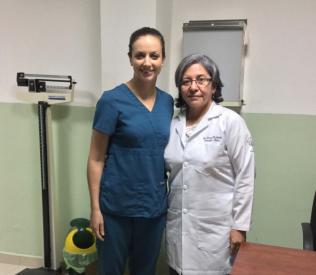Symptom management has been identified as a top educational priority for Honduran nurses. It is also crucial for adults with cancer in Honduras, where a high symptom burden could delay treatment for patients who need to travel a long distance to access care. A trial designed by Dartmouth Cancer Center's rehabilitation scientist Kathleen Lyons, ScD, and Honduran oncologist Suyapa Bejarano, MD, assessed these needs by training four Honduran nurses to implement an evidence-based, telephone-delivered symptom management program.
Twenty-five adults who were receiving chemotherapy for the first time enrolled in the trial. The nurses helped participants deal with 24 different symptoms, with the most common being pain, nausea, and constipation. The nurses appreciated the chance to connect with patients on another level. As one nurse said, the intervention "helps them because they know someone is watching them and reminds them of the dates [of next appointment]. It favors follow-up. Especially when they live alone..."
Meghan Freed, RN, a student at the Geisel School of Medicine at Dartmouth, was funded by Dartmouth's Dickey Center for Global Health to be at the study site at La Liga Contra Cancer in Honduras to train the nurses on the protocol. Megan's fluent Spanish and previous experience working at an HIV clinic in Honduras prepared her to assist Dr. Bejarano in launching the study.
Related publication
Bejarano SA, Freed ME, Zeron D, Medina R, Zuniga-Moya JC, Kennedy LS, Bruce ML, Zubkoff L, Bakitas MA, Lyons KD Feasibility of a Symptom Management Intervention for Honduran Adults Undergoing Chemotherapy. Western Journal of Nursing Research (2019).
